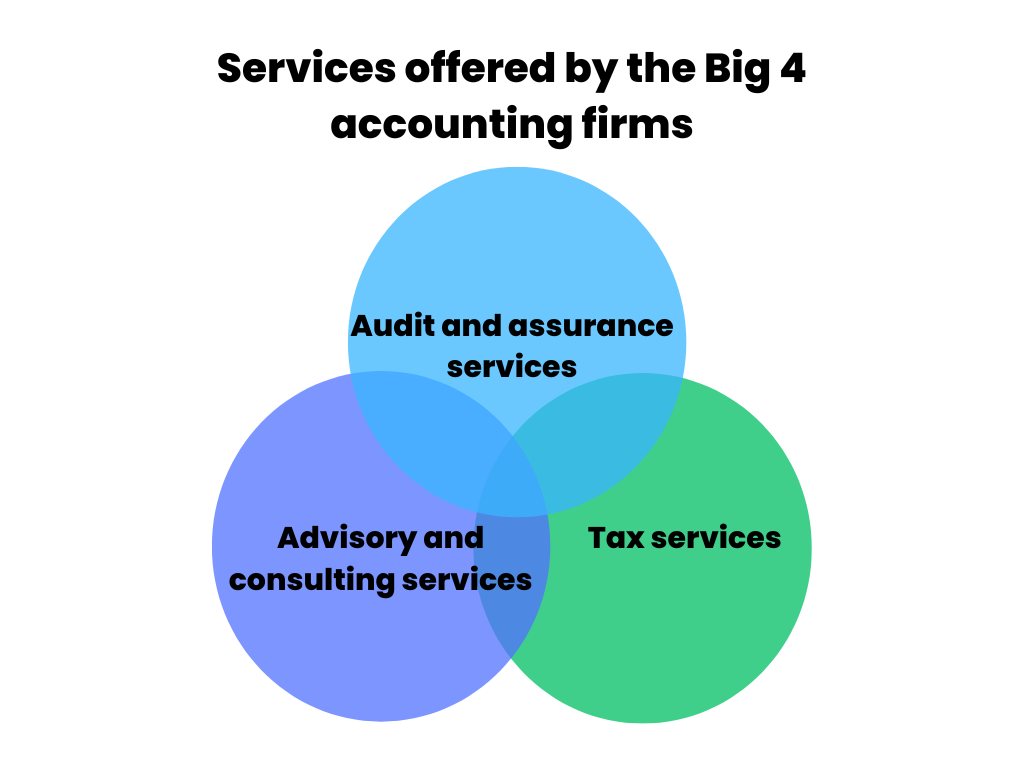In the fast-paced and complex world of finance, where accuracy, transparency, and compliance are paramount, the Big Four accounting firms stand tall as pillars of trust and expertise. Comprising Deloitte, PricewaterhouseCoopers (PwC), Ernst & Young (EY), and KPMG, these industry giants collectively shape the global financial landscape and play an instrumental role in driving business success. With a rich history, diverse services, expansive global reach, and a commitment to excellence, the Big Four accounting firms are at the forefront of delivering unparalleled professional services to clients worldwide. This comprehensive article delves into the origins, services offered, global influence, challenges faced, and future prospects of these distinguished firms, shedding light on their remarkable contributions to the finance industry.
The biggest accounting firms leading the game
When it comes to the accounting world, the Big 4 firms are the undisputed leaders, setting the bar high with their unrivaled expertise and global reach. With their vast resources, diverse service offerings, and unwavering commitment to excellence, the Big 4 firms have cemented their position at the forefront of the accounting profession. They consistently push boundaries, adapt to evolving market trends, and provide invaluable insights that shape the financial landscape. In a competitive field, the Big 4 firms continue to lead the game, offering unmatched services and delivering the highest standards of professionalism, integrity, and expertise. Let’s review and explore this giants.
The Big 4: Deloitte

Deloitte Touche Tohmatsu Limited, commonly known as Deloitte, is a prominent British multinational professional services network headquartered in London, England. As the largest professional services network in terms of revenue and number of professionals, Deloitte holds a prestigious position as one of the Big Four accounting firms, alongside EY, KPMG, and PwC.
Founded by William Welch Deloitte in London in 1845, Deloitte expanded its operations into the United States in 1890. Over the years, the firm underwent significant mergers and acquisitions, including the formation of Deloitte Haskins & Sells in 1972 through a merger with Haskins & Sells, and the formation of Deloitte & Touche in 1989 through a merger with Touche Ross in the US. In 1993, the international firm was renamed Deloitte Touche Tohmatsu, which was later shortened to Deloitte. The firm further expanded in 2002 through a merger with Arthur Andersen’s practice in the UK and several practices in Europe, North America, and South America.
Deloitte provides a wide range of services, including audit, consulting, financial advisory, risk advisory, tax, and legal services, with a global workforce of approximately 415,000 professionals. In fiscal year 2021, the network generated aggregate revenues of US$50.2 billion. Deloitte has also been involved in sponsoring various activities and events, including the 2012 Summer Olympics.
While Deloitte has enjoyed significant success, it has faced controversies and legal challenges. These include its role in a “potentially misleading” report on illicit tobacco trading in Australia, a major cyberattack that compromised client confidentiality and exposed employee information, its involvement as the internal auditor of the insolvent contractor Carillion, and its role as the external auditor of Autonomy, which faced allegations of “accounting improprieties” following its acquisition by Hewlett-Packard.
Despite these challenges, Deloitte continues to be a prominent player in the professional services industry, offering valuable insights, innovative solutions, and exceptional client service on a global scale.
Check out our article on accounting cybersecurity.
The Big 4: PricewaterhouseCoopers (PwC)

PricewaterhouseCoopers International Limited (PwC) has emerged as a trusted global professional services brand, operating through partnerships and standing as one of the esteemed Big Four accounting firms. With an impressive presence spanning 157 countries and encompassing 742 locations, PwC boasts an extensive network supported by a remarkable team of 328,000 professionals worldwide.
Rooted in a rich history that dates back to the 19th century, PwC’s establishment in its current form can be attributed to the merger of Coopers & Lybrand and Price Waterhouse in 1998. This strategic combination brought together decades of expertise and experience, creating a powerhouse capable of delivering exceptional services to clients across various sectors.
PwC’s global success is evident in its robust financial performance, with FY 2022 revenues soaring to an impressive $50.3 billion. These revenues stem from the firm’s core practice areas, namely assurance, tax and legal, and advisory. By offering a comprehensive suite of services, PwC caters to the diverse needs of clients, supporting them in areas ranging from financial transparency and risk management to tax optimization and strategic decision-making.
Based in London, PricewaterhouseCoopers International Limited assumes a crucial role as the coordinating entity for the global network of firms operating under the PwC brand. This central hub ensures a cohesive approach by managing the brand, implementing global policies, and fostering collaboration among member firms. While PricewaterhouseCoopers International Limited does not directly engage in client services, its efforts are instrumental in maintaining the highest standards of quality, risk management, and strategy throughout the network.
With a relentless commitment to excellence, a deep understanding of industry dynamics, and a global footprint, PwC continues to make a significant impact on the business world. By providing invaluable insights, innovative solutions, and unwavering professionalism, PwC remains a trusted partner for organizations seeking expert guidance in today’s dynamic and evolving market.
The Big 4: Ernst & Young (EY)

Ernst & Young Global Limited, widely known as EY, stands as a dynamic British multinational professional services partnership based in London. Renowned as one of the world’s largest professional services networks, EY holds a prestigious position among the esteemed Big Four accounting firms, alongside Deloitte, KPMG, and PricewaterhouseCoopers (PwC). Offering an extensive array of services, including assurance, tax, consulting, and advisory, EY serves as a catalyst for its clients’ growth and prosperity.
Operating as a vast network of member firms, each established as an independent legal entity within the partnership, EY encompasses over 312,250 talented professionals across 700 offices spread across 150 countries. This global reach allows EY to provide comprehensive and tailored solutions to clients from diverse industries and backgrounds, ensuring their success in an ever-evolving business landscape.
The partnership itself emerged in 1989 through the merger of two prominent accounting firms: Ernst & Whinney and Arthur Young & Co. This strategic union laid the foundation for EY’s transformational journey and positioned the firm as a leader in the professional services industry. In 2013, EY underwent a rebranding campaign that officially solidified its identity as EY, though the initials were already informally recognized prior to the formal adoption.
EY’s dedication to excellence has garnered widespread recognition. In 2019, it ranked as the seventh-largest privately owned organization in the United States, attesting to its influential presence and impact. Remarkably, EY has been honored on Fortune magazine’s esteemed “100 Best Companies to Work For” list for an impressive 25 consecutive years, outshining its accounting firm counterparts. This distinction reflects EY’s unwavering commitment to nurturing a positive work environment and empowering its talented professionals.
With an unwavering commitment to client success, a global footprint, and an innovative mindset, EY continues to redefine the boundaries of professional services. By delivering unparalleled expertise, fostering growth, and propelling businesses forward, EY remains a trusted partner for organizations worldwide, empowering them to thrive in an ever-changing and challenging business landscape.
The Big 4: KPMG

KPMG International Limited, commonly known as KPMG, is a multinational professional services network and a member of the prestigious Big Four accounting organizations, alongside Ernst & Young (EY), Deloitte, and PwC. The name “KPMG” represents the amalgamation of “Klynveld Peat Marwick Goerdeler.” This acronym was adopted after the merger of KMG (Klynveld Main Goerdeler) and Peat Marwick in 1987.
While incorporated in London, England, KPMG is headquartered in Amstelveen, Netherlands. The firm operates through a network of firms spanning 145 countries, boasting a workforce of over 265,000 employees. KPMG offers a range of services categorized into three primary lines: financial audit, tax, and advisory. The tax and advisory services are further divided into various specialized service groups catering to specific client needs.
Services offered by the Big 4 accounting firms
The Big Four accounting firms, are renowned global leaders in the accounting industry. With their extensive expertise and vast resources, these firms offer a wide range of services to help businesses navigate the complexities of the modern business landscape. Let’s explore the diverse services provided by the Big Four.

Audit and assurance services
Audit and assurance services are at the core of the Big Four firms’ offerings. These services provide independent assessment and verification of financial information, ensuring transparency and reliability. Each firm offers comprehensive audit services tailored to the needs of their clients. PwC, Deloitte, EY, and KPMG conduct rigorous financial statement audits, internal audits, risk assessments, and other assurance engagements.
Advisory and consulting services
The Big Four firms excel in providing strategic advisory and consulting services to support businesses in making informed decisions. With their deep industry knowledge and expertise, they offer valuable insights and solutions to address complex business challenges. PwC, Deloitte, EY, and KPMG provide specialized advisory services, including strategy consulting, risk management, digital transformation, performance improvement, and operational excellence. They work closely with clients to optimize processes, enhance efficiency, and drive sustainable growth.
Read more about CAS.
Tax services
Tax services offered by the Big Four firms help organizations navigate intricate tax regulations, minimize tax liabilities, and optimize their tax strategies. PwC, Deloitte, EY, and KPMG provide comprehensive tax planning, compliance, and advisory services. They assist clients in various areas, including domestic and international tax planning, transfer pricing, tax compliance, tax controversy, and tax technology solutions. These firms stay abreast of changing tax laws and regulations, ensuring clients remain compliant and maximize tax efficiency.
Other specialized accountant services
In addition to their core services, the Big Four firms offer a range of specialized services to cater to specific client needs. These services vary across firms but can include:
Risk management
The firms provide expertise in identifying and managing risks, helping clients enhance their risk management frameworks and strengthen internal controls.
Financial consulting
Services such as mergers and acquisitions advisory, corporate finance, valuation, and forensic accounting assist clients in making informed financial decisions and addressing complex financial issues.
Technology and digital transformation
PwC, Deloitte, EY, and KPMG offer technology consulting, cybersecurity services, data analytics, and digital transformation solutions to help clients leverage emerging technologies and navigate the digital landscape.
Sustainability and environmental consulting
The firms provide guidance on sustainability practices, corporate social responsibility, and environmental risk management to support clients in achieving their sustainability goals.
Differentiators and areas of expertise
While the Big Four firms offer similar services, each has its own unique strengths and areas of expertise. PwC is known for its industry-specific knowledge and extensive global network. Deloitte is recognized for its comprehensive consulting services and strong technology capabilities. EY has a focus on innovation, digital transformation, and emerging technologies. KPMG is renowned for its risk management expertise and global tax advisory services. Understanding these differentiators can help businesses select the most suitable firm for their specific needs.
Global reach and influence of the Big 4 accounting firms
The global reach and influence of the Big 4 accounting firms, namely Deloitte, PricewaterhouseCoopers (PwC), Ernst & Young (EY), and KPMG, cannot be overstated. These industry giants have built an extensive network of member firms operating in numerous countries, allowing them to serve clients on a global scale.
With their vast resources, diverse expertise, and deep industry knowledge, the Big 4 firms have become trusted advisors to multinational corporations, government entities, and organizations across various sectors. They provide invaluable insights, strategic guidance, and innovative solutions that enable clients to navigate complex business challenges and make informed decisions in an ever-changing global marketplace.
One notable aspect of the Big 4 firms’ influence is their active involvement in shaping accounting standards and regulations. They play a pivotal role in contributing to the development of global financial reporting frameworks, working closely with international standard-setting bodies such as the International Financial Reporting Standards (IFRS) Foundation and the Financial Accounting Standards Board (FASB). Their expertise and thought leadership influence the formulation of best practices and guidelines that enhance transparency, consistency, and comparability in financial reporting worldwide.
Moreover, the Big 4 firms actively engage with regulatory bodies and industry associations to advocate for sound governance, ethical practices, and investor protection. They collaborate with policymakers and participate in public consultations to provide insights and expertise on matters related to financial regulation, corporate governance, and risk management. Their input helps shape the regulatory landscape and promotes the adoption of robust frameworks that foster trust and confidence in the global financial system.
The influence of the Big 4 firms extends beyond their core services. They actively contribute to thought leadership through research reports, industry insights, and whitepapers, sharing their expertise and perspectives on emerging trends, technological advancements, and business strategies. Through conferences, seminars, and webinars, they facilitate knowledge sharing and foster collaboration among industry professionals, further contributing to the advancement of the accounting and finance profession.
Furthermore, the Big 4 firms are committed to corporate social responsibility and actively engage in initiatives that promote sustainability, diversity and inclusion, and social impact. They recognize the importance of aligning business practices with environmental, social, and governance (ESG) considerations, helping clients navigate ESG challenges and opportunities in an increasingly socially conscious business environment.
The biggest challenges and controversies faced by the Big 4 accounting firms
The Big 4 accounting firms, despite their global prominence, have encountered significant challenges and controversies throughout their history. These hurdles have tested their resilience and prompted the firms to implement reforms to enhance transparency, strengthen independence, and improve the quality of their services.
One notable challenge that the Big 4 firms have faced is the fallout from high-profile accounting scandals. Instances such as the Enron and WorldCom scandals in the early 2000s, where auditors failed to detect fraudulent activities, dealt a blow to public confidence in the profession. These scandals exposed weaknesses in audit practices, highlighted conflicts of interest, and raised questions about the effectiveness of financial oversight.
Critics have also raised concerns about the independence of the Big 4 firms and potential conflicts of interest. As these firms provide a wide range of services to their clients, including consulting and advisory work, there is a perception that their independence as auditors may be compromised. Critics argue that the provision of non-audit services to audit clients could compromise objectivity and impair the quality of audits. In response to these concerns, regulatory bodies have implemented stricter rules and regulations to safeguard independence and reduce potential conflicts.
The quality of audits conducted by the Big 4 firms has also faced scrutiny. Some have questioned whether audits sufficiently detect and address financial irregularities, and whether auditors exercise appropriate professional skepticism. The complexity of financial transactions and the evolving business landscape pose challenges to auditors in assessing risk and providing accurate and reliable financial statements. The Big 4 firms have implemented measures to enhance audit quality, such as investing in advanced technology, bolstering training and development programs, and strengthening internal controls.
Regulatory scrutiny and legal actions have further heightened the challenges faced by the Big 4 firms. Regulatory bodies have increased their oversight and enforcement activities to ensure compliance with accounting standards, ethical guidelines, and professional conduct. Legal actions, including lawsuits and regulatory penalties, have placed the firms under intense scrutiny and have had financial implications. These challenges have compelled the Big 4 firms to continually adapt and improve their practices to meet evolving regulatory expectations and maintain public trust.
To address these challenges, the Big 4 firms have undertaken significant reforms. They have invested in advanced technologies and data analytics to enhance the effectiveness and efficiency of their audits. These accounting firms have also bolstered training and professional development programs to ensure their teams possess the necessary skills and knowledge to navigate complex financial landscapes. Additionally, they have embraced stricter governance and risk management practices to strengthen independence, maintain quality, and uphold the highest professional standards.
Thinking big: Future prospects and potential disruptions in the accounting industry
As the accounting industry marches into the future, the Big 4 accounting firms are poised to navigate a landscape that presents both exciting opportunities and complex challenges. The rapid advancement of technology, including artificial intelligence (AI), blockchain, and automation, promises to reshape the profession, opening new avenues for efficiency and innovation.
Artificial intelligence, with its ability to analyze vast amounts of data and perform repetitive tasks, has the potential to revolutionize auditing processes. Machine learning algorithms can identify patterns and anomalies, enhancing the detection of financial irregularities and improving audit quality. The Big 4 firms are at the forefront of incorporating AI into their operations, investing in research and development to harness the full potential of this transformative technology.
Blockchain, known for its secure and transparent nature, has the capacity to revolutionize financial transactions and record-keeping. Smart contracts and distributed ledger technology can enhance the speed, accuracy, and traceability of financial data. The Big 4 firms are actively exploring blockchain applications, collaborating with industry partners to develop innovative solutions that streamline processes, mitigate risk, and enhance trust in financial reporting.
However, alongside these technological advancements, the rise of alternative service providers and changing client expectations present challenges that the Big 4 must address. Start-ups and niche firms specializing in specific services or industries are disrupting the traditional market, offering agile and tailored solutions. Clients increasingly seek value beyond compliance and demand a deeper understanding of their businesses, requiring the Big 4 firms to adapt their service offerings and delivery models.
To thrive in this dynamic environment, the Big 4 firms are redefining their strategies and embracing a more client-centric approach. This accounting firms are enhancing their advisory services, providing strategic insights, and leveraging their deep industry knowledge to help clients navigate complex challenges and capitalize on emerging opportunities. Collaboration with technology partners and start-ups is becoming more prevalent as the firms seek to augment their capabilities and drive innovation.
Furthermore, the Big 4 firms are placing a greater emphasis on talent management and cultivating diverse skill sets within their workforce. They are recruiting professionals with expertise in emerging technologies and data analytics, ensuring they have the skills to harness the power of digital transformation. Investment in ongoing training and upskilling programs is critical to equip their professionals with the necessary tools to adapt and excel in an evolving industry.
Striking the balance between excellent accounting services and your budget: Synder’s Accountants Directory
Are you a new or established business seeking professional accounting services to ensure compliance and keep your books in order? While the services of top accounting firms may be out of reach for many, it doesn’t mean you can’t access high-quality accounting assistance. Numerous smaller accounting firms can provide the same level of precision and attention to detail as the industry leaders. The question is, how do you find them?
Look no further than Synder’s Accountants Directory. This comprehensive directory houses a wide range of accounting experts specializing in various industries. You can browse through the list of firms, carefully selecting the one that aligns with your specific requirements. By entrusting your bookkeeping needs to a professional accounting firm listed in Synder’s Accountants Directory, you can gain peace of mind and benefit from top-notch bookkeeping services.
But that’s not all. Synder goes above and beyond by offering smart automated software to streamline and optimize your bookkeeping processes. With the combination of a skilled accounting firm and Synder’s cutting-edge software, you can enjoy a seamless and efficient bookkeeping experience.
Don’t let budget constraints hinder your access to exceptional accounting services. Explore Synder’s Accountants Directory today and discover the perfect accounting partner to help your business thrive. Take control of your bookkeeping with confidence, knowing that you have the support of a professional firm and the innovative tools provided by Synder. Say goodbye to accounting worries and embrace the peace of mind that comes with superior bookkeeping.
Conclusion
In conclusion, the Big 4 accounting firms have established themselves as pillars of trust, expertise, and influence in the financial world. Their wide range of services, global reach, and active participation in shaping accounting standards have solidified their position as industry leaders. Despite facing challenges and controversies, the Big 4 firms have demonstrated resilience and a commitment to continuous improvement. They have implemented reforms, enhanced transparency, and worked towards regaining public trust. Looking ahead, the future holds both opportunities and challenges.
The Big 4 firms will need to embrace technological advancements, adapt to changing client expectations, and nurture talent to remain at the forefront of the industry. By doing so, they can continue to drive innovation, shape the future of accounting, and deliver exceptional value to clients in an ever-evolving business landscape. The Big 4 accounting firms are poised to leave a lasting impact on the global business landscape, guiding the financial industry towards a future of growth, integrity, and excellence.
Lean more about Top accounting firms in the US.







Keep up the great work! Thank you so much for sharing a great posts.